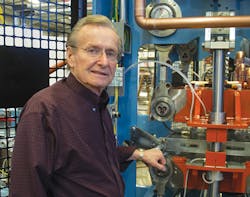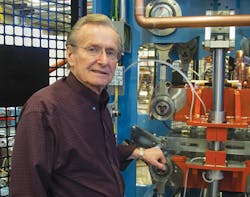Jere Irwin learned the art of machining at a young age and has an enduring respect for the craft. He spends much of his time every day roaming around the thermoforming machinery company that bears his name talking to employees, but admits he enjoys most talking to the machinists and watching them work. "I watch and learn," he says.
Irwin first came in contact with machinery on his family's potato farm. He had two successful businesses before building his first thermoforming machine. There was timely help along the way that he has never forgotten and even today it guides his business. He is known as a prolific designer and inventor.
There is more to Irwin than thermoforming machinery. He owns a Christian broadcasting company and the gun store next door. He owns a company that makes high-end skeet guns and designed an elegant gun sight, even though he himself does not shoot. He has worked on drones and is waiting on a patent for a shower head he designed.
So why is machining such a passion? Irwin explained how important it has been to his career in an interview with Plastics Machinery Magazine Editor Ron Shinn.
Tell us about growing up on the family potato farm.IRWIN: I started working on my dad's farm when I was 12 years old. When I was 14, I went to work in the warehouse where we sorted, washed, bagged and shipped the potatoes. My job was to keep the machinery working. It was simple equipment but it would never work right and it was always breaking down. It was frustrating. I think I learned more about machinery in that warehouse than anywhere else.
How did you get out of the warehouse?IRWIN: I was always designing stuff in the warehouse but I did not know the technology very well. My father-in-law, Floyd Paxton, saw what I was doing and said, 'You can come to work for us at Kwik Lok Corp. and we will show you how to do this stuff properly.' He was manufacturing Kwik Lok plastic bag closures. I caught on very fast because I already had a lot of experience trying to do it the wrong way. He was a fantastic engineer and taught me engineering as well as accounting and purchasing methods.
Did you go to college?IRWIN: I went to junior college but they were not teaching anything I could use, so I decided I had better get to work. I was playing basketball and as soon as the season ended, I got out of there.
What happened with Kwik Lok?IRWIN: After about a year in training, I designed the automatic bag closing machine. Kwik Lok did not have a bagging machine and I asked Floyd if he wanted one. Floyd said no, that he wanted to concentrate on the Kwik Lok closure. I said I was going to build one anyway, and he said, 'Good luck!'
Did you build it for Kwik Lok? IRWIN: No, I separated from Kwik Lok and my new company was called Commodity Packaging. I built a machine for bagging bread. The first one did not work, but the second one did. It started a revolution in bread packaging, which until then came wrapped in wax paper that did not keep the bread very fresh. I did not realize from a marketing standpoint what a powerful product it was. All I knew was that orders for the machines at $7,000 each were coming in as fast as we could build them. The machines were all exactly the same and were very profitable to build.
What became of Commodity Packaging?IRWIN: We had a large company acting as our distributor. They manufactured the bread wrapping machine we were replacing. The orders were coming in fast, and all of a sudden they stopped. It was their strategy to force me sell the company.
So what happened?IRWIN: I was a young and dumb businessman and did not know how to deal with the situation, so I sold the company. All of a sudden, I was rich. I had about $1 million, so I started looking around for something to do. I decided to make thermoformed apple trays. We had a lot of apples in Washington that were shipped in cardboard containers separated by pulp fiber trays.
I bought an extruder, built our first thermoforming machine and all the downstream equipment.
Did that first machine work?IRWIN: Yes, it worked the first time I turned it on. It only took three to four months to design and build. I had a little more experience by then.
So now you are a processor making apple shipping trays. What happened?IRWIN: I soon realized we were not making the kind of money I made with the bread bagging machine. I decided I didn't want to be in this business. I realized building the machinery would be more profitable. So I sold the apple tray business to Boise Cascade.
How did the early days of the thermoforming machinery business go?IRWIN: Things worked pretty well for a while. We started making machines like they made in Germany, which were form-trim machines where you make a form and trim it on the same machine. But we found out that the market in America was different. Our customers wanted bigger machines, so we started building bigger machines and added a separate trim press so we had a complete line.
Was it difficult to start the business?IRWIN: One time I always remember was 1974 when the stock market collapsed. We were just getting started and every order we had was cancelled. The company went down to just two people — my younger brother David and myself. That used up the last of my money. I was thinking, 'How dumb can you be?'
What did you do then?IRWIN: I took the last assets I had and went to a machine auction and bought a whole bunch of machinery for very little money. I set up a machine shop and started making all the parts we had been buying. I had confidence that our machines would sell again when the economy bounced back.
How did your technology advance?IRWIN: In 1972 we started using servo motors. All our competitors were making hydraulic or pneumatic machines. We improved the design of our machines to hold the platen securely and to make them more efficient. Those hydraulic machines were four times as big as our machines and their trim presses were 10 times as big as ours.In 1978 we added a microprocessor-based control system with software specifically written for our thermoformers.
How often do you go to the office and how do you spend your time there?IRWIN: I go in about every day but I don't really have an office. I spend my time talking to people. I work with the engineers to fix the worst thing on our machines and on new projects.
How do you tackle a problem?IRWIN: I gather the young engineers around to discuss the problem and we work out ways to fix it.I love it. I made a commitment when I was working for Floyd Paxton that since he was passing along so much knowledge to me, I would do the same thing someday.
How do you do that?IRWIN: In 1980 we established a school inside our company called Irwin Technical College. Its purpose is to train people in engineering and machining skills. We have probably trained a thousand people over the years — certainly more than we need. We don't make them promise to stay after they are trained and a lot of them leave. I just want to train as many people as possible.
What does the future hold for Irwin Research and Development?IRWIN: We started out making thermoforming machines for foam. But over the last 10 to 15 years we have moved towards machines for solid sheet. That means our machines have to be stronger. We are going through the process of making our foam machines stronger — even stronger than they need to be for foam but strong enough to also process solid sheet.
One of the things we have done is to add a platen lock that holds the platens together under pressure and makes them stronger than the huge machines we are competing with but the machines have the same design that we have always had. This increases the market for us.
Our machines contain more parts that we build ourselves than the machines from any other manufacturer. We do tooling as well and we have the latest design and manufacturing machinery. We are very efficient in what we do.
What have you designed and built that makes you most proud?IRWIN: I am most proud of the work our team did in designing our platen lock. It went through a long development process and field testing. It is an important product for our company because it has allowed us to turn our foam machines into a machine that can be used for solid sheet.
How would you like to be remembered?IRWIN: For the way we train all our people and our business values, both built on Christian principles. It is important that all our people reach their full potential as our business grows.
About the Author
Ron Shinn
Editor
Editor Ron Shinn is a co-founder of Plastics Machinery & Manufacturing and has been covering the plastics industry for more than 35 years. He leads the editorial team, directs coverage and sets the editorial calendar. He also writes features, including the Talking Points column and On the Factory Floor, and covers recycling and sustainability for PMM and Plastics Recycling.


